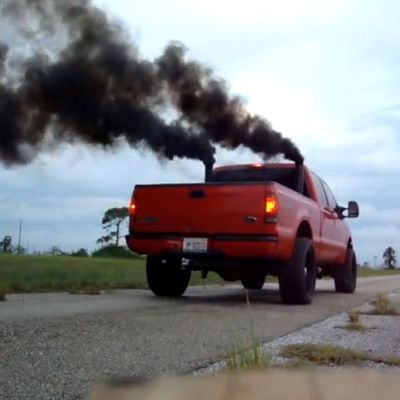
On rural highways and backroads across the U.S., men (and women, too — but mostly men) are unleashing enormous clouds of black, toxic soot from their diesel pickup trucks, an alteration that reportedly costs the truck owner up to $5,000. It’s called “rolling coal,” and it’s become a newly thriving internet subculture, made up of guys whose preeminent hobbies seem to be rolling coal, filming themselves rolling coal, and stroking the egos of fellow coal-rollers on Facebook, Tumblr, Instagram, and YouTube.
Sometimes, the truck drivers have their vehicles belch out smoky fumes purely for the hell of it. But just as often, the smoke is aimed at someone — usually pedestrians, Prius drivers, or anyone else whose actions have a whiff of liberal to them. Slate’s Dave Weigel quotes a person who sells stack kits, the add-ons that allow drivers to expel the soot at whim:
“I run into a lot of people that really don’t like Obama at all,” said one seller of stack kits from Wisconsin. “If he’s into the environment, if he’s into this or that, we’re not. I hear a lot of that. To get a single stack on my truck—that’s my way of giving them the finger. You want clean air and a tiny carbon footprint? Well, screw you.”
As Occidental College sociologist and writer Lisa Wade explained in an email to Science of Us, “it’s a purposefully visual, in-your-face, f’ the environment form of pollution.” (And it brings with it a body count: According to the Clean Air Taskforce’s estimation, diesel exhaust kills 21,000 people prematurely each year.)
As sociologists are wont to do, Wade saw something more in these online images. She calls rolling coal “conspicuous pollution,” a very public way for conservative drivers to simultaneously broadcast that they aren’t worried about whether humans are the cause of global warming and to openly mock the people who are. It’s sort of the funhouse-mirror version of conspicuous conservation, a term coined by economists Steven and Alison Sexton in a 2012 paper describing the very people the rolling-coal guys often intend to mock: Prius drivers.
The Prius remains the vehicle most synonymous with environmental consciousness, even though Honda, Hyundai, Kia, and even good ol’ American carmakers like Ford and Chevy now sell their own well-received hybrids. And that, argue the Sextons, gives Prius drivers a “green halo,” allowing them to publicly show off — whether they mean to or not — just how environmentally friendly they are.
Steve Sexton described the consciousness arms-race in a 2011 post on the Freakonomics blog:
A sort of “keeping up with the Joneses”-type concept but applied to efforts to make society better. I will be competing with my neighbors to donate to a charity, for instance, or to reduce energy conservation or environmental impacts.
Conspicuous pollution, then, is just the opposite. “It’s a response to the people that drive Priuses, a rejection of the modern environmentalist movement, a way to say, ‘You tree huggers are idiots and you can’t tell me what to do,’” Wade said.
An alternate theory, from Weigel, echoes the same principle that explains why some people rush to buy guns after a mass shooting: Better get it now, before it’s banned. Weigel writes:
The liberals seem a little surprised that conspicuous consumption—waste, even—could be a method of protest. They shouldn’t be. The motivation for political coal rolling is roughly the same one that gets people buying guns and ammo after mass shootings. The expectation, every time, is that liberals will capitalize on the shootings to ban guns, so it’s time to stock up.
Either way, it’s no coincidence that this is a subculture primarily made up of white men living in rural areas. Wade mentions a book called On the Fireline, by sociologist Matt Desmond, who interviewed forest firefighters about their relationship to the countryside and their alienation from the big city. “They routinely mocked ‘city boys’ and their identity was strongly tied to a rejection of those people and that way of life,” Wade said. “It wasn’t just about identity, though, it was also about a sense of marginalization and powerlessness.
“We still call rural parts of America ‘the heartland,’ but in a nostalgic way,” she continued. “They’re the past, not the future. The country boys who end up as forest fire fighters live in the ‘flyover states.’ So do the men rolling coal.” Though not everyone who rolls coal ascribes so much meaning to the action. As Robbie, a 25-year-old mechanic quoted in the Vocativ piece, sees it, “It’s just fun. Just driving and blowing smoke and having a good time.”
Even so, Wade argues that by rolling coal, and subsequently publicizing their actions online, that these men are very possibly attempting to rebuild their sense of self in a culture that’s increasingly moving beyond them. “Cities are now the center of our cultural life, the economic viability of their small towns is plummeting, and the values they represent are now seen as backward,” Wade explained. Rolling coal is a way of resisting all of that.
“That’s why they laugh and make fun of blowing their smoke on Prius drivers, cops, women, tailgaters, city boys, and liberals,” she said. “The social and economic power men like them used to command has waned and, understandably, that isn’t a good feeling. So, now they’re looking for power wherever they can get it.”




